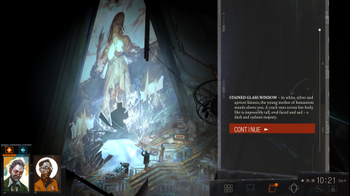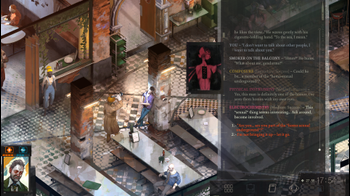
Disco Elysium Review
Disco Elysium was a game that vaguely interested me as it was ramping up towards release, but with a busy Autumn schedule, I simply didn't have time to get around to playing it right away at launch. It wasn't until I started seeing considerable praise for the game from other reviews and acquaintances that I knew I had to make room for it in my schedule. I'm very glad I did.
Disco Elysium, at its core, is a game about people and conversation. I wasn't sure going in exactly how engaging an RPG limited to that sort of interaction could be, but I quickly discarded my doubts only a short while after starting up the game. Whether conversing with the nearby store owner or kicking a mailbox, Disco Elysium's writing style is descriptive, evocative, creative, and perhaps most importantly, often witty & genuinely humorous. It effortlessly transitions from colorful illustrative text to fascinating political ideology to amusingly stupid banter.
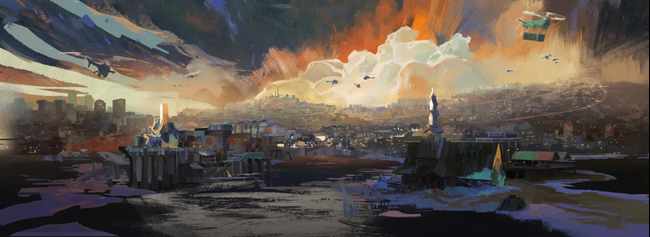
At the game's onset, your character - a middle-aged man - wakes up hungover seemingly after a night of hysterical and heavy drinking, causing all sorts of mayhem at a hostel. He doesn't remember a lick about his current situation: who he is, where he is, or what he's doing there. As this stumbling drunk, you soon meet the eternally patient Kim Kitsuragi. You quickly learn that you both are supposedly members of the local police service sent to investigate a recent homicide - a hanging - that has taken place.
In effect, there are several mysteries the player is set to unravel as they enter the world of Disco Elysium. Of course, there is a dead man hanging out in the back yard of the hostel you wake up in, but there's also the mystery of who exactly you are, as well as a slow realization of the state of the world at large. In some ways, Disco Elysium feels more like reading a great book than playing a game. It's not very often you get to experience such well-written prose within a video game - and a considerable amount of it at that.
Not to discount the other elements that Disco Elysium utilizes exceptionally well. The smeary watercolor-like artstyle offers a somehow grungy yet beautiful depiction of a broken city, while the often melancholic soundtrack perfectly sets the atmosphere.
Disco Elysium is centered on its writing and does not have any combat, with the few combat-like altercations just being an extension of the dialogue systems found throughout the game.
You'll be spending most of your time talking to various characters and suspects about the hanged man, learning about possible motives and eventually a wider conflict engulfing the area. When you aren't talking to characters, you'll be spending your time moving your way through a small section of the city of Revachol in a point-and-click style somewhat reminiscent of classic adventure games.
The city of Revachol is a disgraced capital in a fictional world that underwent a failed communist revolution about 50 years prior to the events of the game. Still wearing the many wounds of artillery fire from the now-occupying force of the capitalist coalition, Revachol is a shadow of its former self and holds little hope for anyone who still lives there. The amnesiac detective will learn more about the struggles centered in the city as he dives deeper into what initially looks to be a simple murder mystery.
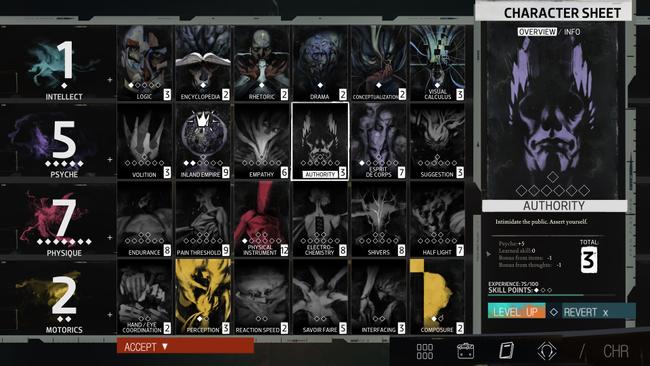
Rather than the typical stats found in RPGs like strength or accuracy, all the stats in Disco Elysium are found in character Atributes like Logic, Pain Threshold, or Composure. With 24 in total, these Attributes define the way you build your character and how you can take part in the game's many dialogue trees. You can shape your officer in a variety of ways such as a brutish idiot, a detective savant, a supernatural-inclined loon, or if you want, a standard proper cop.
These Attributes can alter dialogue sequences in a number of ways. Firstly, they can appear next to dialogue choices that require passing a check by rolling a pair of dice, 2d6 Dungeons and Dragons style. But much, much more interestingly, these Attributes can chime in at essentially any time during the game - if you have enough points in that attribute - and actually speak to the player character. Sometimes these metaphysical parts of your mind simply have an opinion on the current situation, sometimes they have advice about how to proceed with a conversation, and sometimes different attributes can even argue with each other about the topic on-hand. Depending on your stats and character build, the dialogue options available to you will change dramatically.
It doesn't just boil down to these 24 attributes though. The choices you make in the game's dialogue will also sharply mold the type of character you are. One of the forms this comes in is the type of cop you play as, from a Superstar Cop who is a hotshot ready to take on the world, to the Sorry Cop that lets people walk all over you, to the Boring Cop that sticks to the task at hand. You'll also begin to develop your political ideology, from Ultraliberal to Communist to Traditional (cough Fascist cough) and so on.
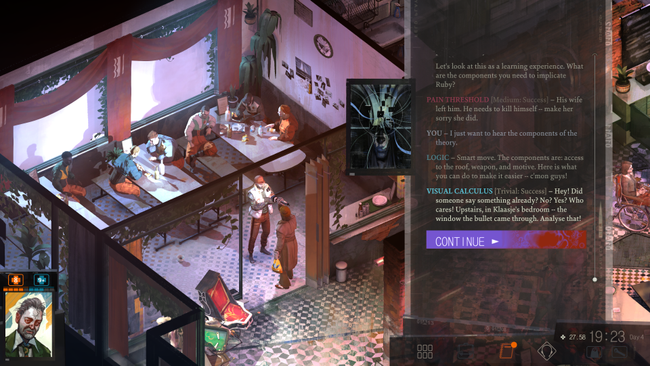
No matter what type of cop you decide to be, it's all excellently bolstered by Kim, an extremely tolerant straight man who works both as a guide and a balance to the unsteady nature of the player character. He is with you essentially every step of the way, and the way player actions and his responses bounce off of each other is exceptionally satisfying. Even though Kim looks to be strictly all business from the onset, you can slowly break away his stoic nature to reveal some of his more subdued personality quirks if you search around in the right places. Perhaps against all odds, a believable bond can form between the unlikely duo.
Once the game starts to detect the types of choices you tend to make, you can gain Thoughts, which are effectively the equivalent of passive skills in other RPGs. You store these Thoughts in your Thought Cabinet, which can also affect the way you can interact with the game's various characters as well as the stats of your personal Attributes. For example, if you keep insisting that the case may have supernatural complications, you can gain the Thought 'Remote Viewers Division', which lowers the difficulty of all PSY type passive checks. If you try to be a hotshot cop, you might get 'Some kind of Superstar', which lowers your Logic but raises your Composure and Suggestion.
While Disco Elysium's dialogue system is absolutely stellar and a joy to read, the game itself is not especially varied when it comes to choice and lasting consequences. You can build your detective in a variety of ways, but the progression of the game's plotline around solving the murder case will generally be the same and ends in the same way with only some slight variations.
Regardless, It's been a long time since I've played a game with such a strong and compelling central theme to everything it does.
I don't want to spoil the experience for those yet to try the game, but there is a very thorough examination of the effects of the past on the shape of the present. This manifests itself in many ways, from the main character's own personal history that comes to light over the course of the game, to a struggling bookstore living in the shadow of a dozen failed businesses in an abandoned building, to a climactic moment at the game's finale, among many other examples. There's a specific through-line that slowly reveals itself in a fashion parallel to the murder mystery itself, and smartly punctuated within the final few hours.
Disco Elysium is a solidly designed game all around. but the one mechanical element that I wasn't too fond of was how stat-boosting equipment was handled. In Disco Elysium, your hat, eyewear, and the rest of your clothing will offer bonuses (or penalties) to your detective's many attributes. Because dialogue and checks are at the core of Disco Elysium's design, these bonuses will often lead to significant boosts in proceeding through dialogue throughout the game. Because of this, eventually, you'll find yourself often opening your equipment menu and shuffling around clothes simply looking for ways to boost immediately-needed stats to pass a check and progress a dialogue tree, which basically boils down to finding as many +1 clothing items as you can. This isn't a functionally broken system or anything like, it's just not inherently interesting compared to everything else the game has to offer.
Disco Elysium is a wonderfully written RPG that defies preconceptions of what RPGs can be. Whether or not it somehow marks its own paradigm shift or inspires a new sub-genre remains to be seen, but for now, I encourage anyone who wants to experience some of the best game writing on offer to give it a try.
